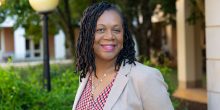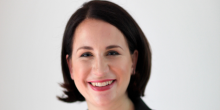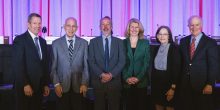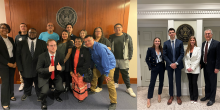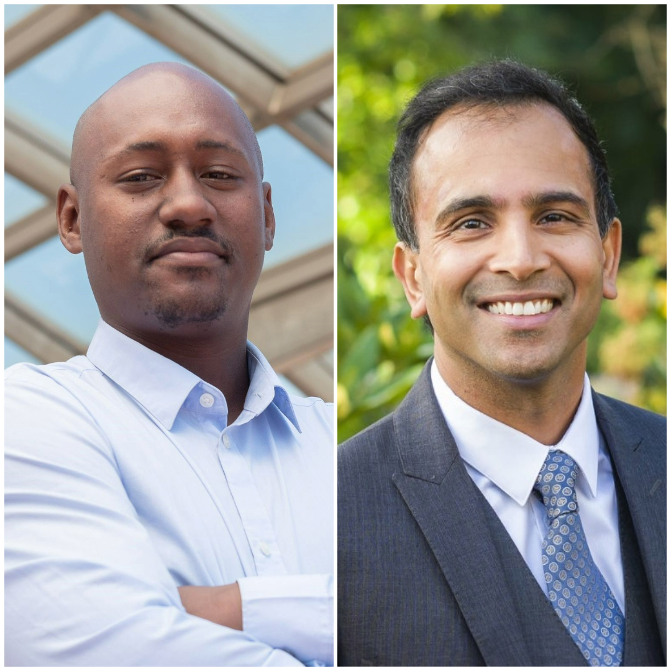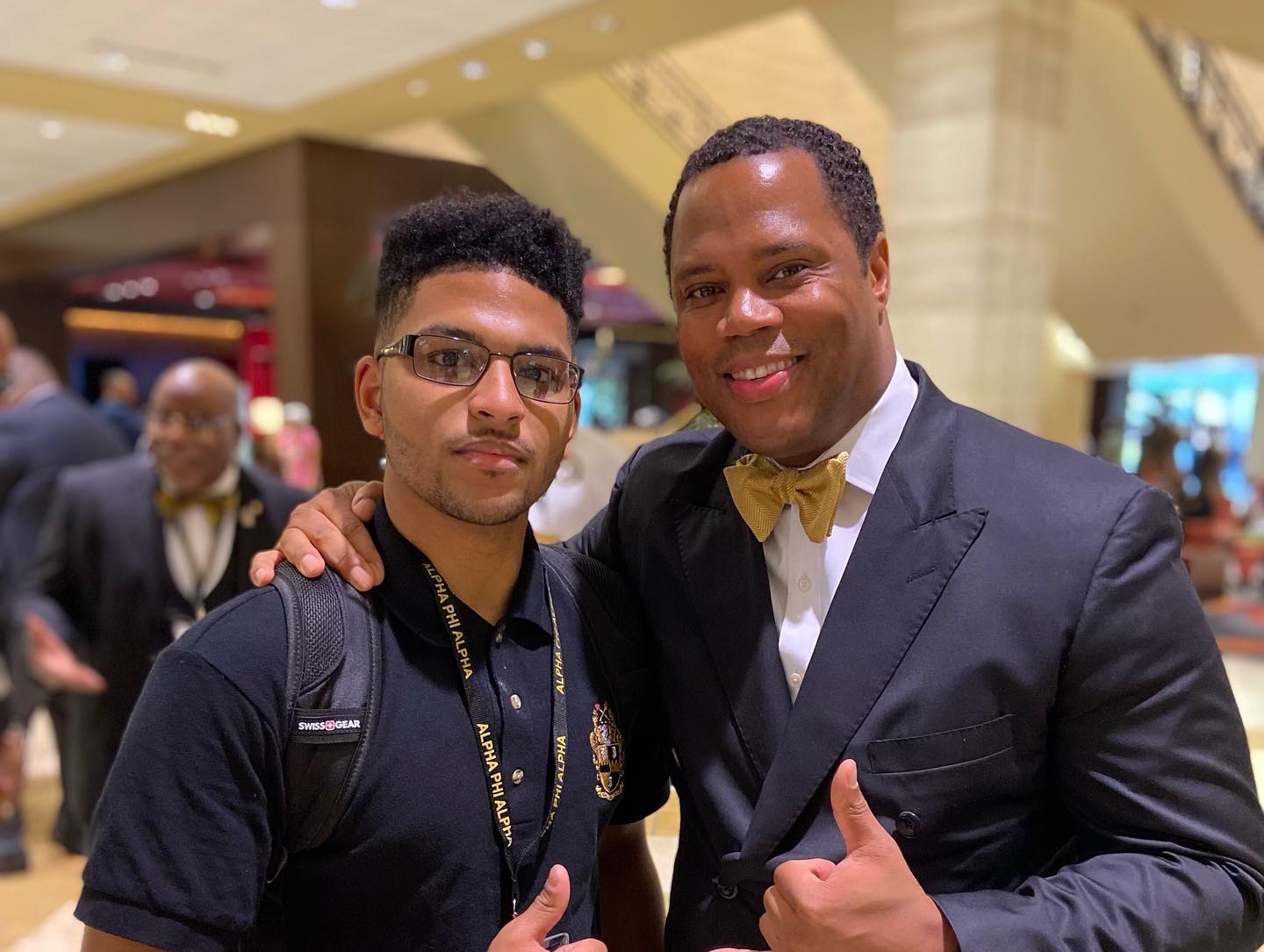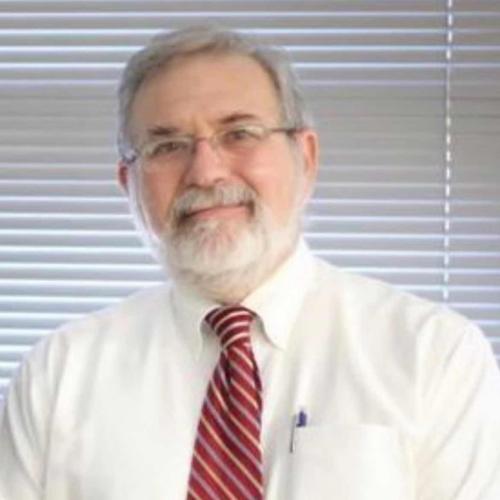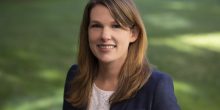
Interview with Professor Meghan Boone
Posted: June 12th, 2024
When I ask Professor Meghan Boone, a fourth-generation Floridian, whether she misses Florida, she smiles. “In February,” she says, while wearing her maroon sweater. But any other time of year, she’s content. Winston-Salem is home now that her family is within an hour and a half radius. It’s also where she serves as an associate professor at Wake Forest Law.
It’s not difficult to figure out the two most important things to Professor Boone: her family and her career. Her face lights up when she talks about them.
Despite her extensive publications and awards (including Faculty Member of the Year, American Association of Law School Scholarly Papers Competition Winner, and Women Who Make a Difference, which she notably chose not to talk about during the interview), Professor Boone exudes humility. She’s also compassionate, which shows in the way she talks about her students and how she relates to them. And she has a quiet wisdom about her.
Professor Boone earned her bachelor of arts degree from Trinity College. She attended law school at American University Washington College of Law and, after graduating, earned her LLM from Georgetown University Law Center. Her academic appointments included a fellowship at Georgetown University Law Center a, professorship at the University of Alabama School of Law, and a visiting professorship at Washington University School of Law. Professor Boone was a visiting professor at Wake Forest Law before joining the faculty full-time in 2020.
And now that she has tenure, she plans to continue her research, which centers on topics related to the state regulation of the physical body, often focusing on the rights of pregnant, birthing, and parenting individuals. Professor Boone is an expert on matters related to lactation law, reproductive rights, family law, and gender equality in the workplace.
Learn more about Professor Boone—professor, attorney, and person—in the interview below.
What was your favorite subject in school?
Starting in seventh grade, most of my classes were theater classes—performance classes, musical theater, and costuming and stage design. That’s what I thought I was going to do.
How did you decide to become a professor?
I knew I wanted to go to a small liberal arts college just because I liked that feel of that small, close-knit community. That’s what I did. I ended up stumbling into a women, gender, and sexuality major. I wanted to write and think and talk about those issues. Halfway through college, I started thinking about law school with the aim to be a public interest attorney, and particularly working on issues of gender equality.
Graduated, clerked, and then got a job at a firm—a plaintiff-side, public interest firm. I was mostly litigating big, nationwide sex discrimination class actions—cool, righteous, impactful litigation. And I thought, great, dream job. And I hated it. Litigation and me just don’t mix. I’m not an adversarial person. I didn’t want to work those sorts of hours. I knew I wanted to have a family one day. The idea of trying to have young kids and keep up that level of facetime in the office was really intimidating.
I started casting about for what else I could do because I was in this weird position of having gotten the dream job and then realizing that the dream job wasn’t a dream, and not really having a backup plan. I applied to a couple of different things, but one of them was this clinical teaching fellowship at Georgetown in their civil rights litigation clinic. This was still public interest litigation, and I’d be able to do individual client work as opposed to these huge, class action cases. Very quickly after arriving at Georgetown, I realized teaching—not litigating—was what I wanted to do forever.
What’s one thing you wish you knew in law school?
That professional trajectories are not linear. And that’s okay. I wish I could go back and tell that version of me not to worry so much about staying on this path where I could see all the steps, knowing that the path was going to be a little bit windy but I would end up in an ok place.
You are an expert on civil rights and anti-discrimination laws, constitutional law, employment discrimination, family law, reproductive rights, and sex discrimination. Are there any accepted “truths” about any of your areas of expertise that you disagree with? If so, what’s your viewpoint, and what evidence or experience supports it?
Fighting the premise of the question, I always think it’s really interesting to declare oneself an expert in anything. I don’t know that I am an expert in anything. And I’m hyper-aware of how much there is to learn and know.
I will use an example: I wrote an essay called “Expecting Violence: Centering the Experience of Violence in Pregnancy” for the Virginia Journal of Social Policy & the Law. In it, I talk about pregnancy as an inherently violent experience. At the workshop where everyone who wrote for the issue was sharing drafts and talking about it, I got a lot of pushback from people in my field who I respect, and who have been writing in this field for a long time. They said, “Unwanted pregnancy is violent, right? Forced pregnancy is violent?” And I said, “No, all pregnancy is violent. The fact that it is wanted or unwanted, forced or unforced adds an additional layer of potential violence, but the physical experience of pregnancy is violent.” And the reaction in the room from some people was, “You cannot say that.”
The generation of feminist scholars at the level above me rejected the idea that all pregnancy was inherently violent. And then the people who were more at my level, the junior level, many of them came up to me after I had this public exchange and said, “I agree with you.” I didn’t walk into the room thinking that part of my paper was going to be controversial. And I haven’t changed my mind about it. But it has been interesting to realize that my thinking about that is so different from the thinking of people that are foundational in my field and who I respect very much.
Roe v. Wade helped make huge strides for reproductive rights. In recent years, it’s like we’ve taken giant leaps backward. What do you think is the future of reproductive rights? How can we get there?
The protections of Roe v. Wade and Planned Parenthood v. Casey had already been deeply undermined by the time the Dobbs decision came down. Obviously, Dobbs is a watershed moment and changes the landscape hugely as far as access to reproductive healthcare, but it’s not as if in the years before Dobbs, it was a rosy picture for reproductive justice. In many ways, Dobbs was reflective of a negative trajectory that had been occurring for at least 15 years before the decision came out. I think that Dobbs woke a lot of people up who thought abortion was always going to be available—people from privilege, people within a certain geographic area, and other people as well. It’s been interesting to talk to my students about it. I think their whole vision of themselves and their place in the world was developed at a time when they could choose whether or not to be pregnant. And the idea that that choice has been taken away from them is really jarring. If there’s a silver lining to Dobbs, it has brought an intention and an awareness to the importance of this fight. More people are getting involved, raising their voices, voting, and showing up to advocate. I think there is hope that within my lifetime we will be back to a place where abortion is protected as a matter of national right.
What is one thing you learned through your scholarship that people should know?
I co-authored a piece with Benjamin McMichael, who is a former colleague of mine at Alabama who does empirical work. The article is about a Tennessee law that criminalized women who used drugs while they were pregnant. The laws are designed to protect fetal and infant life. So the state is going to criminalize prenatal drug use in order to protect fetal and infant life. What the empirical analysis shows is that the effect of the laws is actually to undermine fetal and infant life. More pregnancies are lost and more babies die when we criminalize pregnant people. I think there are a lot of people out there who legitimately care about pregnancy and about babies, and they want to criminalize pregnant people, or outlaw abortion, or take all these steps to protect what they see as a vulnerable life. What they don’t understand, which I have seen in my own scholarship, is that many of these laws end up doing more harm than good. If we could work together to do the things that actually supported women, pregnant people, babies, and families, we would do so much more to protect those vulnerable groups than by criminalizing pregnancy, reproductive healthcare, et cetera.
What has been your biggest win since you began your research and what did the win teach you?
I think recognizing that I have something unique to say and that is true even if the thing I have to say isn’t perfectly polished or perfectly footnoted or exactly right in every respect. I have a unique perspective to offer and I should offer it even when I am unsure or struggle with imposter syndrome or feel like it’s not ready. I’ve finally gotten to a place in my scholarship where I feel comfortable with that.
What is the biggest challenge you are facing in your role and area of expertise and how are you tackling it?
There’s just so much happening—the laws being passed and cases being litigated in the post-Dobbs landscape—that I feel torn between keeping up with the day-to-day on-the-ground stuff because people want to know about it and they want me to talk about it. But I want to think slowly and carefully about big ideas. I want both of those things. You can’t do both.
What is a common myth about your job as a professor? As an attorney?
The biggest misconception is that the vast majority of my time is spent in the teaching part of my job when in reality, it really is a third: a third scholarship, [a third] service, [a third] teaching. And I am not off during the summer. Although I would like to be!
What is the biggest professional challenge you have had to overcome?
Balancing having young kids and doing my job the way I want to do it. And it’s a positive challenge because I really love my kids, and I really like being a mom, and I really like my job. I could give all of my time to my kids and family, and I could also happily give all of my time to my job and work. I want to do both of those things simultaneously. And obviously, that’s not possible.
What’s your top strategy for success?
Some version of “do it before you’re ready,” or “fake it until you make it.” I think we all have to fight against the sense that if something is hard or difficult, it means we’re bad at it and we shouldn’t do it. When I look back at my life and the things that have been really worthwhile and the successes I have had, it is because I have gone through a period where I feel uncomfortable—where it is hard, where I feel unsure, where I’m going out on a limb in some way. I feel like I still look for opportunities to make myself uncomfortable because that’s where growth occurs.
What does your morning routine look like?
My morning starts bright and early with usually some combination of a 7-year-old to 4-year-old and a small hound dog climbing into bed to tell me things or demand waffles or who knows. This morning I had an extremely in-depth conversation about the varying skill levels of Pokemon characters. The morning routine is getting everyone their preferred breakfast carbohydrate, packing lunches, making sure everyone has what they need in their backpacks, and then rushing out the door. It’s a bit chaotic. My 7-year-old, for Christmas, got a Nintendo Switch, which he had been asking for every day for six months. The deal is that if he gets all of his homework done, if he’s dressed, if he’s eaten his breakfast, brushed his teeth, everything—then he gets to play his Nintendo Switch until we leave. It’s really helped incentivize good behavior!
How do you want to be remembered?
As someone who cared a lot and tried hard. I don’t think I’m going to be remembered as the most brilliant person in the world, but I want people to know that I care deeply about them and their happiness and success.
What is a book you would recommend and why?
I will say, I think reading is important. I think it actually doesn’t matter that much what you read. And I will say I have extremely highbrow and extremely lowbrow tastes in what I read. I think it’s all great and people should read what they want!
A book that really blew my mind is called Delusions of Gender by Cordelia Fine. She is a Professor of History and the philosophy of Science, and she walks through all the brain science we have on gender and how it’s actually not very good. And how this idea that our brains are fundamentally shaped by being male or female is not actually supported by science.
And then because I have young children, I often find myself reading books of essays, which are easier to carry around and read for little bits of time. Jesse Kline is a humor essayist and she came out with a book called I’ll Show Myself Out. It is just really, really, really funny and also has some pretty profound insights into being a woman and being a mother in this world that we live in, but does so in a way that had me laugh-crying.
What’s your favorite thing to bake?
I make a chocolate cake, which I think is the most delicious chocolate cake that I have ever had. So much so that I really won’t eat other people’s chocolate cake because it’s not this chocolate cake. It doesn’t look like anything special, but it is so freaking delicious. It’s my favorite.
What is one question you wish I would have asked you and how would you have answered?
“What has been something in your life that has enabled you to be successful?” My answer would have been that—and I’m paraphrasing Ruth Bader Ginsburg here—the most important decision you will ever make is the person that you partner with. Nothing in my life would be possible if I didn’t have a spouse who is supportive, kind, invested in me, invested in our family, and invested in being equal partners. I think that’s especially true for young women—finding a partner who is interested in bringing equality and their full selves to their domestic lives.
My partner and I have had a very explicit agreement up to this point that my career comes first, which is an unusual circumstance for a woman who is married to a man to find. It has made all the difference for me because I’ve been able to make professional moves and work the hours I need to, or do whatever I can because I have someone who’s backing me up. The advice I would give to young people is to pick someone who’s going to back you up. Because that is such a primary source of support when things don’t go right.
